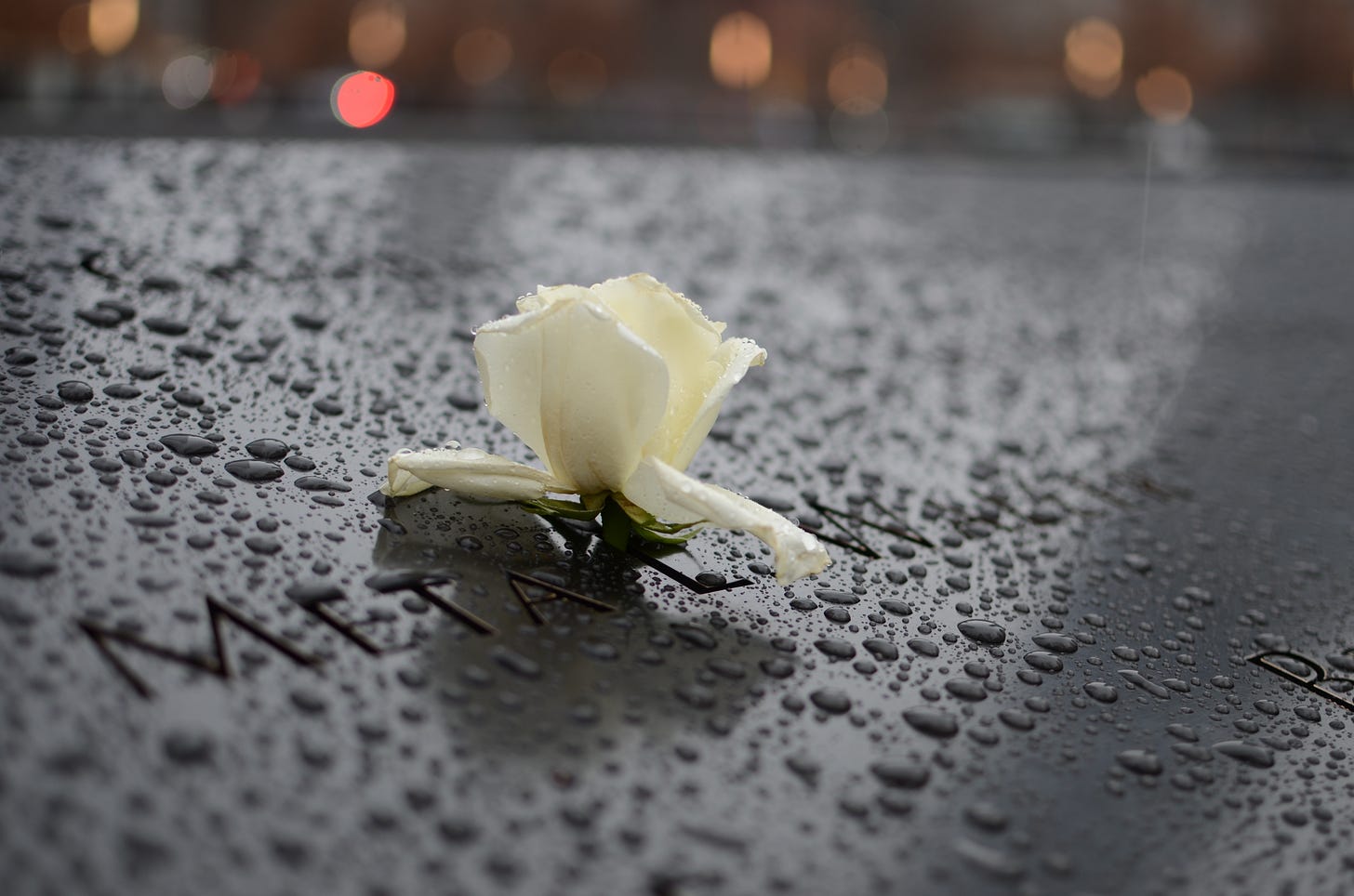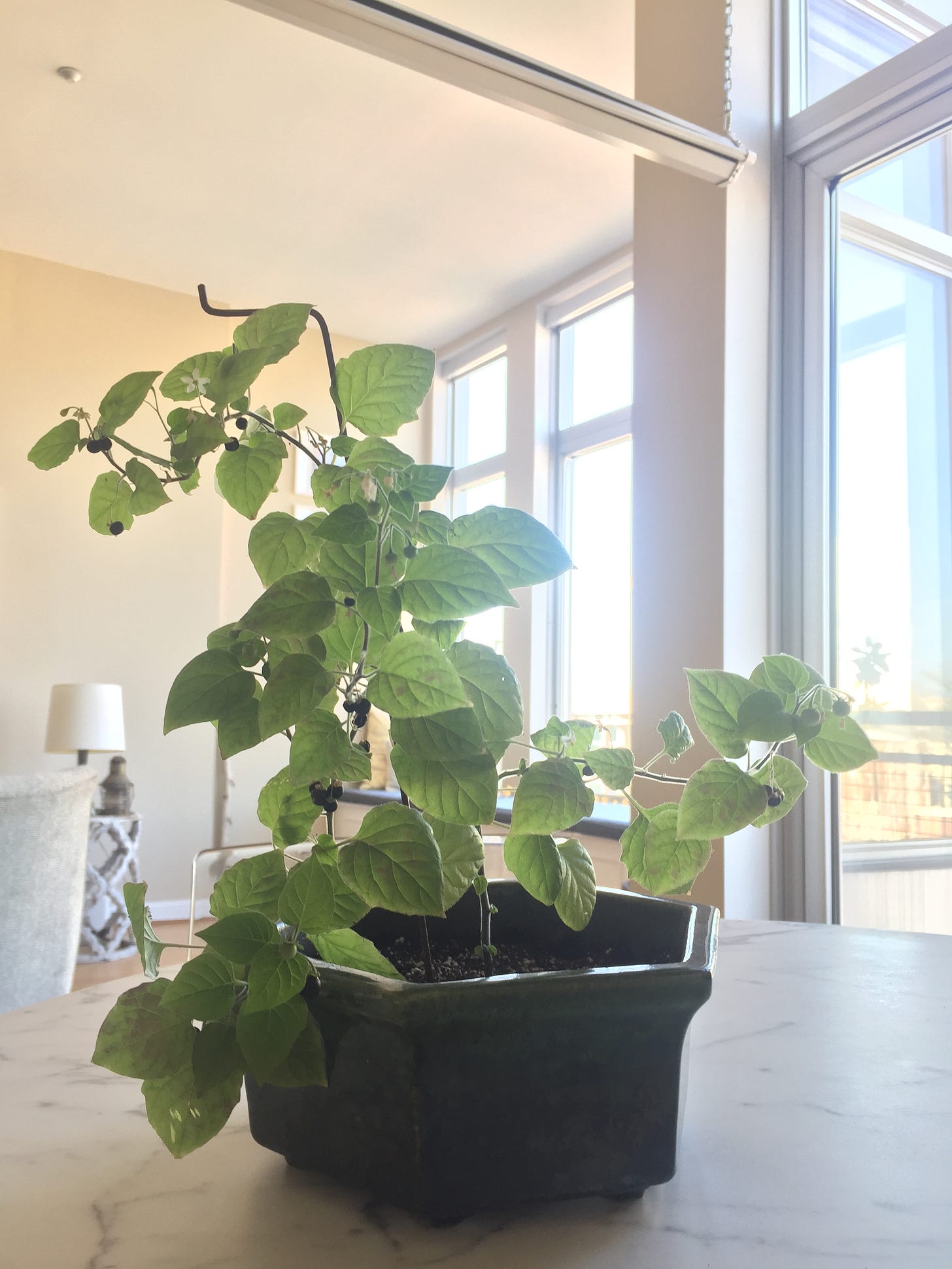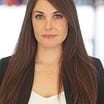Rewind time. Before the morning sunlight poured through my window as I sat on the couch writing this. Before the day in 2021 when I went to the CIA’s headquarters in McLean to do a video report on the 20-year anniversary of 9/11 — right after Afghanistan collapsed to the Taliban, who had harbored al-Qaeda after 9/11, the irony not lost on me. I was told that some of the agency’s younger intelligence officers had no memory of the attack. And for the first time in my life, I felt old.
Before the day in 2018 when I had an argument with a volunteer at the 9/11 Memorial at Ground Zero in New York, because he said my employer NPR was fake news. Then I swiped a sapling under a miraculous Callery pear, the famous Survivor Tree, put it in a plastic shot glass from a nearby street vendor who was selling potato vodka, filled the tiny cup with water, and brought it back to DC. I watched the iconic white flowers bloom in September and thought, I am growing a piece of history. About nine months later, I learned I was growing Black Nightshade, a common but poisonous shrub.
Before the summer day when I was visiting New York and wandered over to the memorial, watched some pretty girls take smiling selfies by one of the pools in the footprint of a tower, and realized I was too overwhelmed to be there alone.
Before an Irish Catholic boyfriend had a birthday on Sept. 12. We went out for dinner that night and he talked about what a sad birthday it was for him in the first years after the attack. His family had also chosen to change their Muslim-sounding surname out of security concerns, leading to tensions with some relatives.
Before the ten year anniversary of Sept. 11 in 2011, when my dad tied a $250 mattress I had bought off of Craigslist to his old, banged up van. My mom got into the front seat, and I sat precariously in the back, on a shimmery green mid century chair, surrounded by all the other things I was bringing to Washington, D.C. I had to get settled before my Master’s program at Johns Hopkins started, the first step in my dream to become a travel writer. I had to find a job too. And we listened to my dad’s smooth jazz, as big American flags hung from the bridges and construction cranes… and we drove gingerly, not just because of all the breakable things in the back, but because we wondered if there could be another terrorist attack between New York and Washington. Just a few days before, the Washington Monument had cracked in an earthquake — an omen of the political rifts ahead? We put the furniture in the empty little studio that became mine and my parents drove off, and I had no choice but to grow up.
Back to the day itself. Sept. 11, 2001.
A still, crystalline day, with no clouds in the sky to spare us. It was passing time at my high school, and still early enough in the academic year that we seniors in a leafy, southern Connecticut town, in a shadow of New York really, believed we were supposed to rule the halls. It was all Dawson’s Creek and Abercrombie & Fitch, with the beautiful people on the paper shopping bags. My walk was still buoyant, as I entered English or Film — I can’t remember which one anymore.
A guy I used to joke around with in Math class was just leaving the room. “Hey did you hear about what happened to the World Trade Center?” he asked me.
“No,” I said.
“A plane hit one of the buildings.”
“That isn’t funny!” I told him.
“I’m not joking,” he said. The second hijacked plane was minutes away from its final destination.
The teacher rolled in one of those bulky TVs, and we sat quietly, watching the newscasters try to make sense of what we were seeing. There was no social media back then, no video streaming. And somewhere in the administrative offices, a decision was made to end the school day early.
I was still too young to drive, so I stood outside waiting, and the buses quickly arrived. Now you could see gray in the sky. And some towns deeper south found ash on their windowsills. Meanwhile the trains that had brought so many of our parents into New York stopped their service of bringing them home. With the tiny purple cell phone my parents let me have at 16, I finally reached my dad, who had been in the city that day.
Then I was sitting on the floor in our family room, eating a biscotti, as we gathered around the TV. The scenes could have come from an action movie. But the reporters were saying the same things over and over again. So I went outside and sat on our deck, watching the sun go down on another day.
Somehow I had learned geometry and read the Odyssey, but no one had ever taught me that you could just go to work and die. Because people somewhere far away just hated you. What was the point of putting all that preparation and training into life, when you may not get to live it? What was the point of it all? My mom asked if I’d come inside, and I wasn’t ready. I just sat there, staring into the night.
Around 9:30pm, CIA Director George Tenet reportedly told President George W. Bush that al-Qaeda was behind the attack. It would take more time for the FBI to gather the terrorists’ names. And I was lucky. No one in my family or friend circle died at their hands. But that day took away something invisible from me, which I only realized after the years went by.
Readers, is there a word for when something bad happens, and you know your life will change but you have no idea how?
That’s what it felt like, waking up into Sept. 12 as a high schooler. I was nervous. Nervous for the day. Nervous for what lay ahead. For what kind of adult I would have to be in the bruised, pulsating world I would one day inherit.
Before the wars in Iraq and Afghanistan, and now on Ukraine and between Israel and Hamas, before a rise in hate crimes and the birth of Al-Shabaab, Boko Haram, and ISIS, before immigration became a partisan battle and Russian disinformation stoked ignorance and discontent, before a global pandemic stopped us all in our tracks, Sept. 12 found me marveling at how all of the bullshit of high school was gone. The impenetrable cliques, the fickle popularity contests, the academic pressure receded. People were kind. They walked through the halls asking each other, “How are you?” They hugged each other.
That night, on Main Street, people held candles. Was it a vigil? Probably. I just remember the glow. Incandescent. I wanted to believe things would be okay. I didn’t think about what we would remember, what we would forget, what we would conjure as the years went by. The national questions around justice, security, and compassion debated but never truly answered. I just waited.








I was one of those teachers who had just gotten to school (California). It was the anniversary of my mom’s death so until the moment the news announced what happened I was thinking of her. I didn’t think of her again until I got home. I sat in shock as the early bird students arrived not knowing. We watched the channel one broadcast and talked all day. I felt so bad that I couldn’t help the kids make sense of it all.
I lived in a suburb north of Chicago and what I remembered from that day was the beautiful, breathtaking color blue of the sky. I later found out it was the same color in Santa Fe, where I later moved. Evidently, it was the same blue in many other parts of the country, too.
I later found out that blue sky was called “Severe Clear” by weather forecasters and pilots. I’ve haven’t experienced it any more than a few times since 2001, but when I do, I call it a “9/11 day”. I feel melancholy and the feelings of sadness don’t go way til the sun goes down.